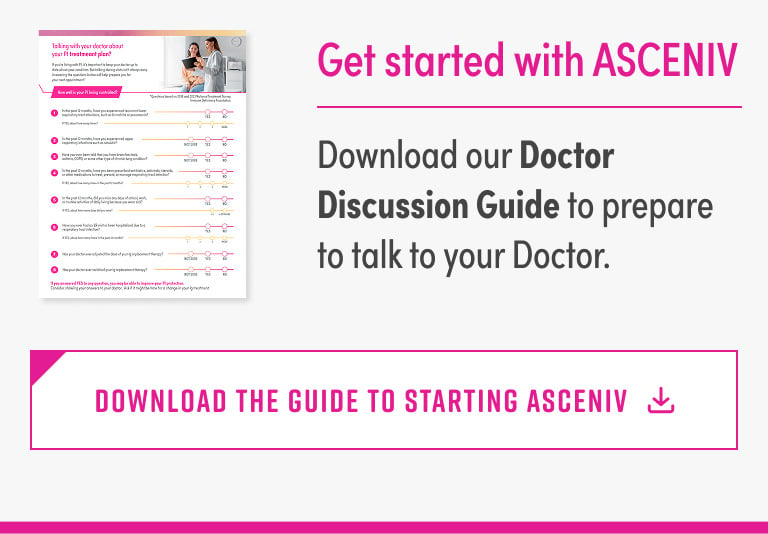

Talk to your doctor about whether ASCENIV is right for you
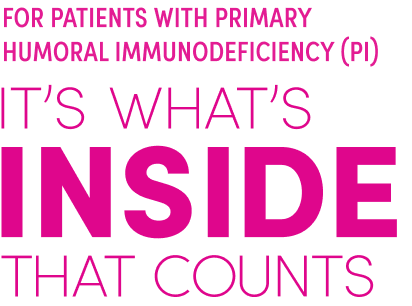

Talk to your doctor about whether ASCENIV is right for you
FOR PATIENTS WITH PRIMARY HUMORAL IMMUNODEFICIENCY (PI)

FOR PATIENTS WITH PRIMARY HUMORAL IMMUNODEFICIENCY (PI)

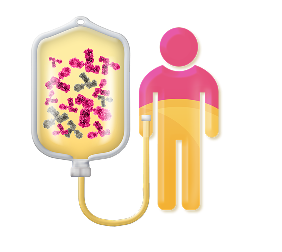
- ASCENIV is an intravenous immune globulin (IVIG) for adults and adolescents (12‑17 years of age) with PI.
- ASCENIV provides proven protection against infection and has a demonstrated safety profile.
- Unlike other IVIG products, ASCENIV is manufactured by blending normal and specialty plasma.
- Plasma is the yellow liquid left over when red blood cells are removed from whole blood and is obtained from donations from people with healthy immune systems. Ig is removed from the collected plasma and purified.
- ASCENIV is an intravenous immune globulin (IVIG) for adults and adolescents (12 -17 years of age) with PI.
- ASCENIV provides proven protection against infection and has a demonstrated safety profile.
- As with other IVIG products, ASCENIV is manufactured from plasma, the yellow-colored liquid left over when red blood cells are removed from whole blood. Plasma is obtained from donations from people with healthy immune systems. Ig is removed from the collected plasma and purified.
Discover the ASCENIV™ difference
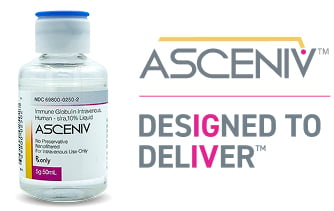
Discover the ASCENIV™ difference
Select donor profile
The only available IVIG product made with a proprietary method for donor screening AND plasma pooling.
Quality in every vial
Every vial includes a broad spectrum of antibodies, taken from plasma pooled from at least 1,000 donors.
ASCENIV is the only IVIG that uses ADMA’s patented methodologies for donor screening and plasma pooling
ASCENIV meets FDA IVIG criteria but also includes plasma from donors selected for their elevated antibody levels for certain respiratory pathogens.
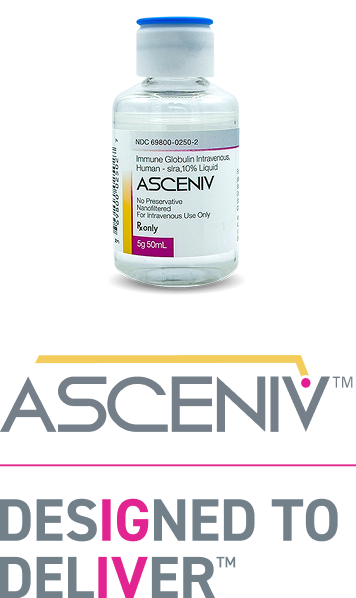






So whether ASCENIV is your first Ig or a switch from another formulation, you can think of it as an opportunity to meet your treatment goals.
Demonstrated safety profile
|
The most common side effects in the ASCENIV™ clinical trial were
|
|
|---|---|
|
|
These are not all the possible side effects of ASCENIV. If you experience the above or any other side effects while taking ASCENIV, call your healthcare provider immediately or dial 911. You are encouraged to report side effects of prescription drugs to ADMA Biologics at 1-800-458-4244, or the FDA. Visit www.fda.gov/MedWatch or call 1-800-FDA-1088. |
Watch Kyler's story
Watch Sherry's story
Watch Lisa Marie's story

“I'm so grateful that I have ASCENIV in my corner”
MEET LISA MARIE, 55-year-old nurse, married with a blended family of 5 children, living with a rare blood vessel disease in addition to PI
Read Lisa Marie’s full story
Hide full story
MY STORY
For as long as I can remember, whenever I got sick, I would get very sick. One year, I had strep throat 13 times.
MY PI DIAGNOSIS
Despite my complicated health history, I was never quite sure what was wrong with me. At age 43, I was diagnosed with PI. I tried 2 other immunoglobulin treatments before switching to ASCENIV.
MY EXPERIENCE WITH ASCENIV
I now receive monthly infusions. I already can tell it’s made a major difference in my health.
As a nurse, I know the importance of protecting my immune system, especially being immunocompromised. I can go on trips with my friends and family – none of which would have been possible before beginning treatment.
I can do more and be more present for things that I had to give up because of PI.

“With ASCENIV, I’m looking forward to just being a kid”
MEET KYLER, 17-year-old student, passionate about sports photography and an enthusiastic lacrosse player
Read Kyler’s full story
Hide full story
MY STORY
I was diagnosed with PI as a baby and hospitalized very often with recurrent infections.
Growing up, I missed a lot of school because I was sick all the time and had to stay home. I wasn’t able to hang out with friends or play sports like other kids my age. It felt like I had to stop doing everything.
MY PI DIAGNOSIS
While I was on other immunoglobulin treatments for PI, I was still getting infections. I was still sick almost every day to the point where we were going to doctors twice a week to try to figure out what was going on. I was spiraling; I went from a multi-sport athlete to a full-time patient. I switched to ASCENIV when I got to a point where nothing else was working.
MY EXPERIENCE WITH ASCENIV
Since starting ASCENIV, I am back to playing all my favorite sports again. For the first time, I can attend lacrosse practice with my team after a full school day; I used to have trouble just getting through classes.
It really changed my outlook for the future.
.png?width=132&height=132&name=Mask%20group%20(1).png)
“Thanks to ASCENIV, I got my life back”
Read Lynne’s full story
Hide full story
MY STORY
I had always felt like I had something going on with my health. My frequent absences due to sickness created challenges at work.
MY PI DIAGNOSIS
I received excellent care from my allergist and primary care physician, but I still was never consistently healthy.
After years of trying to determine what was wrong, I was diagnosed with PI at age 62.
MY EXPERIENCE WITH ASCENIV
My immunologist then prescribed me ASCENIV, and I’ve been receiving monthly infusions for 2 years. After being on treatment for a little while, I realized I was healthier for longer periods of time and spending less time resting or recovering from illnesses.
I’m able to do more of what I love and spend more time with the people I love.

“Before ASCENIV, I kind of just existed”
Read Regina’s full story
Hide full story
MY STORY
My first encounter with PI was through my daughter. At 10 years old, she was finally diagnosed with the condition after having been sick with nonstop infections for 2 years.
I, too, had always struggled to recover from any type of sickness, even after taking antibiotics. But before my daughter became ill, I’d never heard of PI.
MY PI DIAGNOSIS
When I began to experience recurrent infections like my daughter did, I met with her immunologist. Soon after, I was diagnosed with PI at age 48 and was initially prescribed an immune globulin treatment.
My doctor then switched me to ASCENIV, and after a few months of treatment, I noticed a significant improvement in my health.
MY EXPERIENCE WITH ASCENIV
I feel better, and I’m back to living the life that I want.
I used to miss so much work due to being sick, and even when I was at work, I rarely felt completely well. But now, I don’t remember the last time I needed to take a sick day.
I’m so glad that my daughter and I received the diagnoses we needed. And I’m grateful that I found a way to get my life back through ASCENIV.

“Thanks to ASCENIV, the old me is coming back”
Read Sherry’s full story
Hide full story
MY STORY
I didn’t think anything was wrong at first. I always thought I sufferer from constant infections because I worked in a nursing home where illnesses could easily be spread. But even after I moved to working in hospice care, I continued to get sick frequently.
MY PI DIAGNOSIS
After nine months of searching for the right diagnosis, my doctors told me I had PI. Over the next 16 years, I tried many different treatments that temporarily helped my symptoms, but didn’t quite sustain me for as long as I needed. That all changed when I started ASCENIV.
MY EXPERIENCE WITH ASCENIV
Now, I can enjoy traveling, hiking, and spending time with my husband and loved ones without being worn out for days afterward. Living with primary immunodeficiency can be challenging, but for me, ASCENIV makes it easier. I’m glad my doctors helped me find the treatment that’s right for me.
Every patient’s experience with ASCENIV will vary, and there are potential risks and side effects with ASCENIV.
-1.png?width=360&name=112666_GettyImages-81859875_RGB%201%20(1)-1.png)
.png?width=277&name=Group%20(18).png)
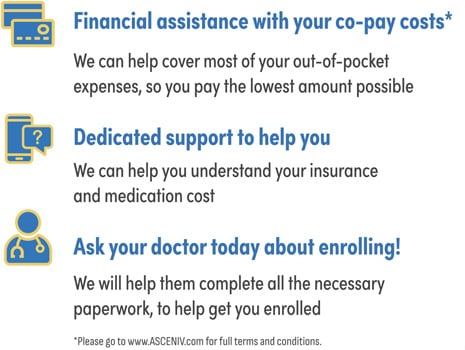

Important Safety Information for ASCENIV™
WARNING: RISK OF BLOOD CLOTS (THROMBOSIS), POOR KIDNEY FUNCTION, AND INABILITY TO FILTER WASTE FROM KIDNEYS. BLOOD CLOTS MAY OCCUR WITH INTRAVENOUS IMMUNE GLOBULIN PRODUCTS, INCLUDING ASCENIV.
Before taking ASCENIV, talk to your doctor if you:
-
Are of advanced age
-
Are unusually sedentary (long periods of sitting down or inactive)
-
Are taking estrogen-containing medicines (birth control pills, hormone replacement therapy)
-
Have a permanent intravenous (IV) catheter
-
Have hyperviscosity of the blood (diseases such as multiple myeloma or other causes of elevated proteins in the blood)
- Have cardiovascular (heart) problems or previous history of stroke
Thrombosis may occur even if you do not have any risk factors.
Serious kidney problems and death can also happen in certain patients who receive such products.
If you are at high risk of thrombosis or kidney problems, your doctor should adjust the dose of ASCENIV and will monitor you for signs and symptoms of thrombosis and viscosity, as well as kidney function.
What is ASCENIV (immune globulin intravenous, human-slra)?
ASCENIV (immune globulin intravenous, human-slra) is a prescription medicine to help adults and adolescents (12 to 17 years old) with primary immunodeficiency fight and prevent infections.
ASCENIV is for intravenous administration only. ASCENIV is made from healthy human blood/plasma.
Who should not use ASCENIV?
ASCENIV should not be used if you had a severe allergic reaction to human immune globulin or if you have been told by a doctor that you are immunoglobulin A (IgA)-deficient and have developed antibodies to IgA and hypersensitivity after exposure to a previous plasma product.
What are possible warnings and precautions with taking ASCENIV™?
Hypersensitivity. Severe allergic reactions may occur with immune globulin products, including ASCENIV. If you have a severe allergic reaction, stop the infusion immediately and get medical attention. ASCENIV contains IgA. If you have known antibodies to IgA, you may have a greater risk of developing potentially severe allergic reactions.
If you take ASCENIV or a similar immune globulin product, you could experience a serious and life-threatening blood clot (thromboembolism). This may include pain and/or swelling of an arm or leg with warmth over the affected area, discoloration of an arm or leg, unexplained shortness of breath, chest pain or discomfort that worsens on deep breathing, unexplained rapid pulse, numbness, or weakness on one side of the body. If you are at risk, your doctor may decide to adjust the dose of ASCENIV. Your doctor will monitor you for any signs or symptoms of blood clots or poor blood flow in your arteries.
Always tell your doctor immediately if your medical history is similar to what is described here, and especially if you experience any of these symptoms while taking ASCENIV.
Kidney problems or failure. Kidney problems, kidney failure, and death may occur with use of human immune globulin products, especially those containing sucrose (sugar). ASCENIV does not contain sucrose.
If you have kidney disease or diseases with kidney involvement, your doctor should perform a blood test to assess your hydration level and kidney function before beginning immune globulin treatment and at appropriate intervals thereafter. If your doctor determines that kidney function is worsening, they may discontinue treatment. If your doctor determines you to be at risk, they may start your dose of ASCENIV at a safe level.
People taking human immune globulin products, including ASCENIV, may experience hyperproteinemia (high levels of protein in the blood), hyponatremia (low levels of sodium in the blood), and hyperviscosity (poor blood flow). Your doctor may perform certain blood tests and monitor you to minimize any of the above risks.
Aseptic meningitis syndrome (AMS). Aseptic meningitis is a non-infectious inflammation of the membranes that cover the brain. It causes a severe headache, which may occur with human immune globulin treatment, including ASCENIV. AMS usually happens within a few hours to 2 days after treatment. AMS is more commonly associated with higher doses of treatment and/or after rapid infusion. Your doctor may perform a neurological exam, including spinal tap (sampling fluid which surrounds the spinal cord) to evaluate your condition and to rule out other causes of meningitis.
Hemolysis. Hemolysis refers to the destruction of red blood cells. Immune globulin products, including ASCENIV, may contain certain antibodies that can result in the rupturing of red blood cells. Your doctor should monitor you for signs and symptoms of hemolysis, which may include additional confirmation tests.
Taking intravenous human immune globulin products may cause a build up of fluid in the lungs (pulmonary edema) that is unrelated to heart problems. Your doctor should monitor you for lung-related side effects and may conduct appropriate tests that can detect the presence of certain white blood cells (anti-neutrophil antibodies) in the drug or your blood. If needed, your doctor may decide to use oxygen or other respiratory methods to help your breathing.
Transmissible infectious agents. Because ASCENIV™ is made from human blood, it may carry a risk of transmitting infectious agents such as viruses, the variant Creutzfeldt-Jakob disease (vCJD) agent, and, theoretically, the Creutzfeldt-Jakob disease (CJD) agent. Your doctor will report to the manufacturer any cases of suspected infections spread by the product.
Interference with lab tests. Because ASCENIV contains a variety of antibodies that are infused into your body, blood tests to determine antibody levels may provide misleading interpretations. Be sure to always tell your doctor, nurse, or lab technician of any medicines you are taking and that you are using ASCENIV.
Interactions with medicines. ASCENIV can make vaccines (like measles, mumps, rubella, and chicken pox vaccines) less effective in your body. Before you get any vaccines, tell your healthcare provider that you take ASCENIV.
What are other possible side effects of ASCENIV?
In clinical studies of ASCENIV, some patients experienced the following:
- Headache
- Sinus inflammation (sinusitis)
- Diarrhea
- Intestinal lining inflammation caused by virus (gastroenteritis)
- Common cold (nasopharyngitis)
- Upper respiratory tract infection
- Bronchitis
- Nausea
These are not all the possible side effects of ASCENIV.
Talk to your healthcare provider about any side effect that bothers you or that does not go away.
You are encouraged to report negative side effects of prescription drugs to the FDA.
Visit www.fda.gov/MedWatch or call 1-800-FDA-1088.
Please Click here for full Prescribing Information for ASCENIV.
Important Safety Information for ASCENIV™
WARNING: RISK OF BLOOD CLOTS (THROMBOSIS), POOR KIDNEY FUNCTION, AND INABILITY TO FILTER WASTE FROM KIDNEYS. BLOOD CLOTS MAY OCCUR WITH INTRAVENOUS IMMUNE GLOBULIN PRODUCTS, INCLUDING ASCENIV.
Before taking ASCENIV, talk to your doctor if you:
-
Are of advanced age
-
Are unusually sedentary (long periods of sitting down or inactive)
-
Are taking estrogen-containing medicines (birth control pills, hormone replacement therapy)
-
Have a permanent intravenous (IV) catheter
-
Have hyperviscosity of the blood (diseases such as multiple myeloma or other causes of elevated proteins in the blood)
- Have cardiovascular (heart) problems or previous history of stroke
Thrombosis may occur even if you do not have any risk factors.
Serious kidney problems and death can also happen in certain patients who receive such products.
If you are at high risk of thrombosis or kidney problems, your doctor should adjust the dose of ASCENIV and will monitor you for signs and symptoms of thrombosis and viscosity, as well as kidney function.
What is ASCENIV (immune globulin intravenous, human-slra)?
ASCENIV (immune globulin intravenous, human-slra) is a prescription medicine to help adults and adolescents (12 to 17 years old) with primary immunodeficiency fight and prevent infections.
ASCENIV is for intravenous administration only. ASCENIV is made from healthy human blood/plasma.
Who should not use ASCENIV?
ASCENIV should not be used if you had a severe allergic reaction to human immune globulin or if you have been told by a doctor that you are immunoglobulin A (IgA)-deficient and have developed antibodies to IgA and hypersensitivity after exposure to a previous plasma product.
What are possible warnings and precautions with taking ASCENIV™?
Hypersensitivity. Severe allergic reactions may occur with immune globulin products, including ASCENIV. If you have a severe allergic reaction, stop the infusion immediately and get medical attention. ASCENIV contains IgA. If you have known antibodies to IgA, you may have a greater risk of developing potentially severe allergic reactions.
If you take ASCENIV or a similar immune globulin product, you could experience a serious and life-threatening blood clot (thromboembolism). This may include pain and/or swelling of an arm or leg with warmth over the affected area, discoloration of an arm or leg, unexplained shortness of breath, chest pain or discomfort that worsens on deep breathing, unexplained rapid pulse, numbness, or weakness on one side of the body. If you are at risk, your doctor may decide to adjust the dose of ASCENIV. Your doctor will monitor you for any signs or symptoms of blood clots or poor blood flow in your arteries.
Always tell your doctor immediately if your medical history is similar to what is described here, and especially if you experience any of these symptoms while taking ASCENIV.
Kidney problems or failure. Kidney problems, kidney failure, and death may occur with use of human immune globulin products, especially those containing sucrose (sugar). ASCENIV does not contain sucrose.
If you have kidney disease or diseases with kidney involvement, your doctor should perform a blood test to assess your hydration level and kidney function before beginning immune globulin treatment and at appropriate intervals thereafter. If your doctor determines that kidney function is worsening, they may discontinue treatment. If your doctor determines you to be at risk, they may start your dose of ASCENIV at a safe level.
People taking human immune globulin products, including ASCENIV, may experience hyperproteinemia (high levels of protein in the blood), hyponatremia (low levels of sodium in the blood), and hyperviscosity (poor blood flow). Your doctor may perform certain blood tests and monitor you to minimize any of the above risks.
Aseptic meningitis syndrome (AMS). Aseptic meningitis is a non-infectious inflammation of the membranes that cover the brain. It causes a severe headache, which may occur with human immune globulin treatment, including ASCENIV. AMS usually happens within a few hours to 2 days after treatment. AMS is more commonly associated with higher doses of treatment and/or after rapid infusion. Your doctor may perform a neurological exam, including spinal tap (sampling fluid which surrounds the spinal cord) to evaluate your condition and to rule out other causes of meningitis.
Hemolysis. Hemolysis refers to the destruction of red blood cells. Immune globulin products, including ASCENIV, may contain certain antibodies that can result in the rupturing of red blood cells. Your doctor should monitor you for signs and symptoms of hemolysis, which may include additional confirmation tests.
Taking intravenous human immune globulin products may cause a build up of fluid in the lungs (pulmonary edema) that is unrelated to heart problems. Your doctor should monitor you for lung-related side effects and may conduct appropriate tests that can detect the presence of certain white blood cells (anti-neutrophils) in the drug or your blood. If needed, your doctor may decide to use oxygen or other respiratory methods to help your breathing.
Transmissible infectious agents. Because ASCENIV™ is made from human blood, it may carry a risk of transmitting infectious agents such as viruses, the variant Creutzfeldt-Jakob disease (vCJD) agent, and, theoretically, the Creutzfeldt-Jakob disease (CJD) agent. Your doctor will report to the manufacturer any cases of suspected infections spread by the product.
Interference with lab tests. Because ASCENIV contains a variety of antibodies that are infused into your body, blood tests to determine antibody levels may provide misleading interpretations. Be sure to always tell your doctor, nurse, or lab technician of any medicines you are taking and that you are using ASCENIV.
Interactions with medicines. ASCENIV can make vaccines (like measles, mumps, rubella, and chicken pox vaccines) less effective in your body. Before you get any vaccines, tell your healthcare provider that you take ASCENIV.
What are other possible side effects of ASCENIV?
In clinical studies of ASCENIV, some patients experienced the following:
- Headache
- Sinus inflammation (sinusitis)
- Diarrhea
- Intestinal lining inflammation caused by virus (gastroenteritis)
- Common cold (nasopharyngitis)
- Upper respiratory tract infection
- Bronchitis
- Nausea
These are not all the possible side effects of ASCENIV.
Talk to your healthcare provider about any side effect that bothers you or that does not go away.
You are encouraged to report negative side effects of prescription drugs to the FDA.
Visit www.fda.gov/MedWatch or call 1-800-FDA-1088.
Please Click here for full Prescribing Information for ASCENIV.

